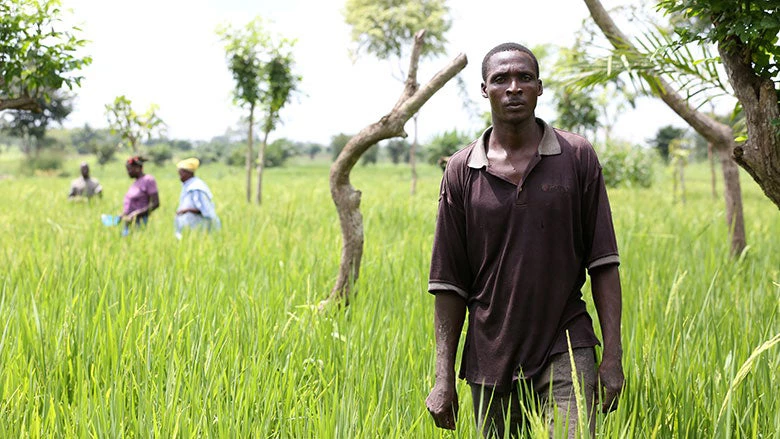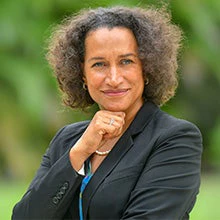
On a hot and dusty day in mid-October, I drove out some 70 to 90 kilometers outside of Togo’s capital city of Lomé, leaving the bustling urban center behind to meet with some of the country’s hard working small holder farmers in their fields.
Over 50% of Togo’s estimated seven million people is engaged in agriculture, accounting for nearly 30% of economic activity over the past five years. While urban areas have been growing rapidly, notably in and around Lomé, some 60% of the population continues to live in rural areas, with over 65% of these households (about 2.8 million out of 4.2 million) living in poverty. Given Togo’s high rate of rural poverty—with 55% of households living below the poverty line in 2015 and a majority being in rural areas—the World Bank and the Global Agriculture and Food Security Program (GAFSP), a multi-donor trust fund established in 2010 to improve food security in the world’s poorest countries, financed Agriculture Sector Support Project (PASA) has been working to help nearly 14,000 small holder farmers and 3,300 livestock farmers improve their livelihoods and provide better futures for their families.
In the context of preparing Togo’s Country Partnership Framework, it was important for me to understand first-hand the challenges and constraints that these farmers face and how to better address their precarious situation. Out in Komlan Souley’s rice field in Fofokopé, he talked to us about the support he received to improve his rice cultivation and the boost he experienced in his earnings thanks to the project. His improved income has allowed him to build a house, feed and clothe his children, and send them to school. One of his greatest sources of pride is the fact that one of his sons, at 17 years old, has completed secondary school and received his baccalaureate.
Rice producers like Souley, as well as farmers producing soy, cassava, and corn, are participating in the PASA mainly through cooperatives called ESOPs (Entreprises et services d’organisation des producteurs), set up by the project to organize producers and help them access inputs (seeds and fertilizers), improve their productivity and the quality of their crops, and—most critically—get their crops sold at a better price than they would be able to get on their own. Each of the 20 ESOPs created throughout the country is led by a local non-governmental organization,Entreprise Territoire et Développement, which coordinates the participating farmers. The ESOPs then help them pool their savings to finance the inputs, materials, and equipment used to process their crops, as well as to pay for start-up activities. However, the project does not include infrastructure investments such as irrigation schemes, despite the critical need to improve irrigation in a country where agriculture is primarily rain-fed, and where climate change has made the rainy seasons increasingly unpredictable.
Rebuilding capacity and restructuring the agriculture sector
In 2008, when the World Bank reengaged with Togo after six years of suspended disbursements due to arrears, and some 15 years of donor disengagement due to a political crisis, the country was emerging from a period of isolation that had left its mark socially, economically and physically.
“Our primary focus in agriculture was on rebuilding capacity, re-organizing, and restructuring the sector,” explained Ayao Midekor, project coordinator of the PASA. “The focus of the PASA was primarily one of an emergency, transitional response. Now, we need to move to a more sustainable and long term response that must include everything from ensuring that the ESOP model is sustained after the project closes to investing in infrastructure, including improved irrigation systems,” he explained.
As highlighted by Souley, the control of water resources has been one of the most common refrains from farm communities during the Togo Systematic Country Diagnostic (SCD) consultations, when asked what would help improve their lives. Better access to finance, mechanizing farming (which remains very labor intensive), insurance for farmers, energy services, rural roads, and other basic services are also frequently cited as key to improving outcomes and opportunities for farmers, and for Togo’s agriculture.
Despite Togo’s natural comparative advantage in agriculture when compared to other countries, its inability to increase productivity and diversify into higher-value-added products has held back the sector’s performance and the country’s economic growth. Among the key constraints to a more productive agriculture is the lack of effective policies to assure adequate provision of inputs (seeds, fertilizers) to producers, as well as to develop more accessible markets for goods, thus reducing investment, productivity, and agricultural incomes. Taxation of agriculture and of the agricultural value chain is another major constraint to the development of larger-scale, commercial agriculture and efficient input and output markets for smallholders. Although smallholder producers like Souley will most likely escape direct taxation, taxes levied on buyers, warehouses, exporters, or processors, if paid, could mean less income for the producer. Meanwhile, nearly half of the country’s 3.4 million hectares of available arable land remains uncultivated.
During our discussion, I am pleased to confirm that the World Bank is reflecting on future support that takes a more long-term approach to the development of the agriculture sector, as it prepares the new Country Partnership Framework (CPF). The CPF will be our first medium-term strategy for Togo since reengaging in 2008. It will be an opportunity to shift from emergency and short term approaches to longer term investments to help Togo tackle its stubborn poverty rates and the underlying issues that hinder agricultural productivity and transformation of the sector.


Join the Conversation